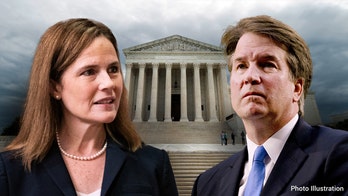If the question of why American businesses remain too timid to invest while they sit on over $1 trillion in cash is perplexing, consider the case of businessman Brett McMahon. McMahon is a Vice President of Miller and Long, a Washington D.C. area construction firm that specializes in building high rises.
What began as two ex-G.I.'s doing handyman work from a pick-up truck in 1947 has become a multi-million dollar outfit with more than a thousand employees and a thousand buildings topped off in cities across the mid-Atlantic. Despite that immense growth and success, McMahon has soured on what he calls the stifling array of taxes and regulations, which he says continue to hold his business and the American economy back from recovery.
In a recent interview at Miller and Long's modest Bethesda, Maryland headquarters, McMahon held up a $50,000 bank loan written to his company in 1962. All the documentation for it is included on one single page. The documentation for a similar loan, written thirty years later in the 1990's fills an inch thick binder. And one written today would fill three times that much.
"They've got to learn to leave us alone," says a frustrated McMahon, of the federal government. "The need for fundamental structural change in the size, role, and scope of the federal government is essential."
Of particular concern to him is the corporate tax code. Before 1908 no U.S. business was taxed at the federal level. Now with a top rate of 39.2 percent, U.S. corporate taxes are second most expensive in the world, ranking only behind Japan's.
Many economists say that those rates are one of the primary reasons that hundreds of U.S. businesses have fled overseas, where tax burdens are lower. But, as with other regulatory burdens, it's not just the high rate at which his company is taxed that leads to the exodus. It's the complexity of the process itself.
As a junior employee years ago, McMahon was tasked with keeping track of the weekly changes to the code.
"We had the entire thing in paper. It was 38,000 pages long and every week I would get a new 15 pages in to replace something else,” McMahon said. “The Constitution is four pages and covers everything. It’s idiotic. You just can’t run a railroad like that."
Now 71,000 pages long and growing, the tax code and its mind-numbing complexity is at last getting some attention from both ends of Pennsylvania Avenue. Such unlikely bedfellows as House Budget Committee Chairman Paul Ryan, R-Wis., and President Obama have gone on record supporting a simplification of it.
In a major address at George Washington University last February 15th, the President said, "The whole concept of corporate tax reform is to simplify, eliminate loopholes, and treat everybody fairly."
Economists agree that complexity is counterproductive to jump-starting the economy.
"You want people to make decisions that are based on good economics, not what loophole can I find in the tax code," says economist Mark Robyn of the Tax Foundation.
But as welcome as any attempt at tax simplification would be to American businesses, such efforts are also guaranteed to meet with tremendous resistance. Loopholes have become part and parcel of doing business in the America.
Corporations hire armies of attorneys, accountants, and lobbyists to seek out and even carve out loopholes that ultimately serve to effectively lower their tax burden.
"If we could get rid of those, we could cut the tax rate, raise the same amount of revenue and be much better off," Robyn says.
But that same army of lawyers, accountants and lobbyists who seek out loopholes, credits and breaks for their corporate bosses, will be at the ready to preserve them, if tax simplification gains a foothold in Congress.
























